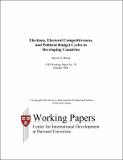| dc.contributor.author | Block, Steven A. | |
| dc.date.accessioned | 2019-05-01T14:30:34Z | |
| dc.date.issued | 2001-10 | |
| dc.identifier.citation | Block, Steven A. “Elections, Electoral Competitiveness, and Political Budget Cycles in Developing Countries.” CID Working Paper Series 2001.78, Harvard University, Cambridge, MA, October 2001. | en_US |
| dc.identifier.uri | http://nrs.harvard.edu/urn-3:HUL.InstRepos:39611569 | * |
| dc.description.abstract | This paper presents the first cross-country evidence of electorally-motivated changes in the composition of public expenditures in developing countries. Results show that election-year public expenditures shift towards more visible current consumption and away from public investment goods. To date, empirical tests of political business cycles have ignored compositional effects. Evidence further shows that these effects are contingent on elections being competitive, and that in competitive systems expenditure shares on capital investment are higher in general. This suggests that when incumbents are generally more accountable to voters, an incentive may exist to maximize long-run, despite the accentuated short-run electoral incentive in competitive systems to diverge in favor of more visible forms of public expenditure. | en_US |
| dc.language.iso | en_US | en_US |
| dc.publisher | Center for International Development at Harvard University | en_US |
| dc.relation.isversionof | https://www.hks.harvard.edu/centers/cid/publications | en_US |
| dash.license | LAA | |
| dc.title | Elections, Electoral Competitiveness, and Political Budget Cycles in Developing Countries | en_US |
| dc.type | Research Paper or Report | en_US |
| dc.description.version | Accepted Manuscript | en_US |
| dc.relation.journal | CID Working Paper Series | en_US |
| dc.date.available | 2019-05-01T14:30:34Z | |


